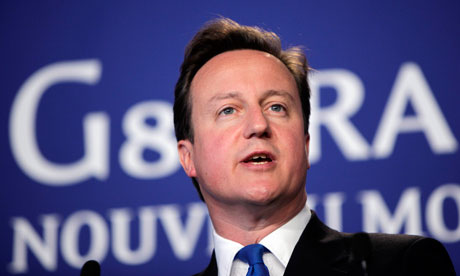PM launches passionate defence of Britain's commitment to international aid and calls on other leaders to fulfil their pledges
- guardian.co.uk,
- Article history

David Cameron at the G8 summit in Deauville, France. Photograph: Markus Schreiber/AP
David Cameron has made a scathing attack on his fellow leaders over aid to Africa at the end of their G8 summit, saying they were seen by the public as a bunch of men in suits, more interested in a good lunch than keeping their promises to the world's poorest.
He also issued a broadside against readers of the Daily Mail, reminding them that Britain's aid budget was intended to save the lives of women in childbirth and to spare people in Africa from malaria.
In a polemic issued midway through his G8 press conference at Deauville in France, he even argued it would have been better for Afghanistan if a fraction of the money now spent there by the UK military had earlier instead been spent on aid.
His emotional defence of his spending priorities was made in response to a Daily Mail article which had claimed that a report showing Britain spends more on aid than its G8 partners, was damning.
The prime minister has been under growing pressure from Conservative backbenchers, as well as the defence secretary, Liam Fox, to reduce the growing aid budget in the face of the recession, but clearly believes he will not shift on his promise to raise it to reach the target of 0.7% of British GDP by 2015.
In a passionate defence of his stance, he said: "I think what people back home think about these summits is that a bunch of people in suits get together, make some promises, particularly to the world's poorest; then they go in and have a big lunch, and forget about the promises. I am not prepared to do that. These are things that matter."
He recalled that he had thought it right that the world's politicians at the G8 summit in 2005 made public pledges to help the world's poorest. But he pointed out that they failed to match those promises of a $50bn (£30bn) increase in aid, falling short by $19bn in real terms, a point he had insisted was in the communique.
His officials said that twice in private G8 sessions he raised the inability of world leaders to match their promises; the chief culprits are Germany and Italy.
He went on: "If we are going to get across to the poorest people in the world that we care about their plight, and we want them to join one world with the rest of us, then we have got to make promises and keep promises. Of course it is difficult when we are having to make difficult decisions at home, but I don't think 0.7% of our gross national income is too high a price to pay for trying to save lives."
He then directly addressed Daily Mail readers: "If you are not convinced it is right to vaccinate children against diarrhoea, to try and stop preventable diseases, and to try and save mothers in childbirth, if that does not do it for you, what about this argument?
"These countries that are broken, like Somalia and Afghanistan, if we don't invest in them before they get like that, we end up with the problems; we end up paying the price with the terrorism, the crime and the mass migration, and the environmental devastation.
"If we [had] spent a fraction of what we are paying now in Afghanistan on military equipment, into that country as aid and development when it had a chance perhaps of finding its own future, would that have not been a better decision? I know this is a controversial argument, but it's an argument that can be won."
He went on: "Most people in this country want Britain to stand for something in the world, and to be something in the world and to punch above our weight. That did not just require military and diplomats, but also having a substantial aid budget to help at times of hurricanes, tsunamis or earthquakes.
"I remember as a young politician watching the 2005 Gleneagles summit, and that Live 8 concert [events at 10 G8 locations and broadcast worldwide], and thinking it was right those world leaders made their pledges so publicly. I think when you make a promise to the poorest people in the world, you should keep it. And I am proud that Britain is doing that."

No comments:
Post a Comment